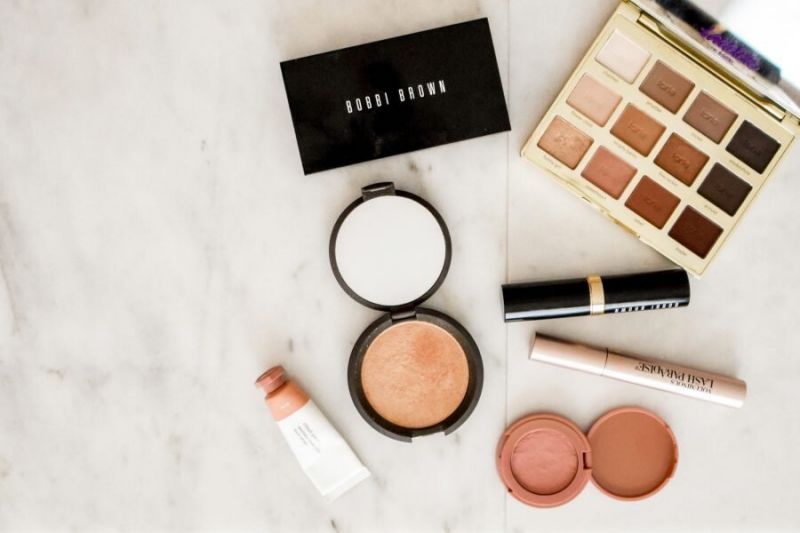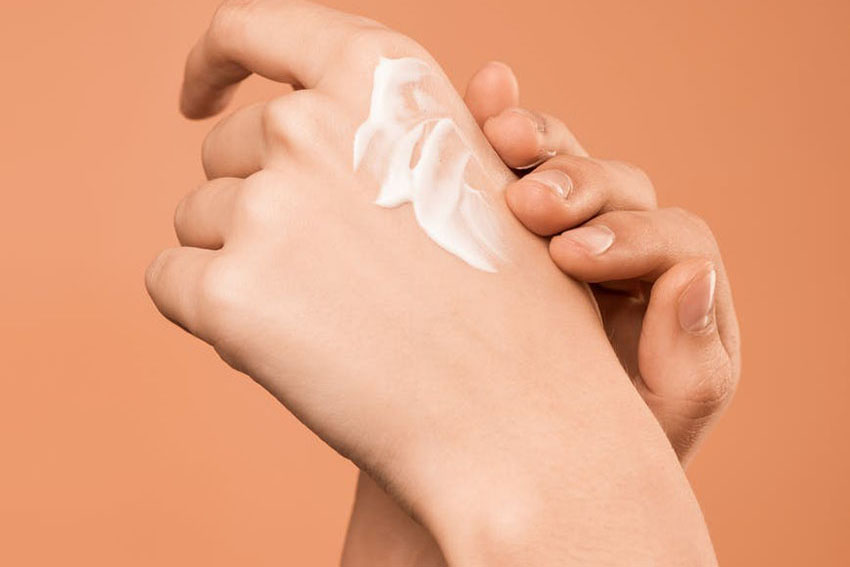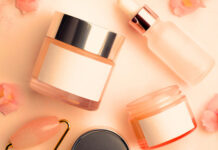In response to the COVID-19 pandemic, the CDC released guidelines for sanitizing almost every surface, but what about our daily makeup and skincare products? A recent study found that women use no less than 16 products per day, leading us to wonder if our routine was as susceptible to infection as our bodies.
To find out more, we reached out to a range of experts to better understand the potential danger—and some of their responses came as a surprise.
“We don’t know much about how SARS-CoV-2 (the virus that causes COVID-19) persists in beauty products,” said Angela Rasmussen, Ph.D., a virologist at Columbia University. “Viruses need a host cell to replicate so they usually don’t last outside of a host for weeks, unlike bacteria,” she continued.
The beauty industry’s response to this pandemic has varied widely. Glossier temporarily closed stores and pop-up shops. While Sephora canceled in-store services and encouraged customers to shop online by offering free shipping. Morphe’s response has been to prohibit customers and staff from using product testers, a necessary change according to Anita Sturnham, M.D., a GP specializing in dermatology and the founder of Decree Skincare. “In my mind, sharing makeup and using in-store makeup testers is a big no,” she confirmed.
But COVID-19 isn’t the first viral outbreak to raise health concerns within the beauty industry. In 2013, a Harlem woman sued MAC Cosmetics after she allegedly contracted oral herpes after testing a lipstick in the brand’s booth during a Rihanna concert. But what does this mean for the products we already have at home and use on the daily?
Can COVID-19 live on your beauty products?
While it’s unclear exactly how long the coronavirus remains active outside the body, studies have reported activity anywhere from two hours to nine days depending on the surface. All of the experts we spoke with recommended proceeding with your regularly scheduled beauty regimen cautiously, as the exact longevity of SARS-CoV-2 has not been tested in beauty products. Dr. Rasmussen offered straightforward guidance: if you contract the coronavirus, avoid using any products, and definitely avoid sharing yours with other people.

Shuting Hu, ph.D., a cosmetic scientist and founder of Acaderma skincare products, recommends creating two distinct areas in your home: a contamination zone and a clean zone. When you return home, “leave all contaminated items (outer clothes, shoes, handbags, etc.) in the ‘contaminated zone.’” After you’ve washed your hands, sterilize all items you bring into the “clean zone.” However, the CDC currently recommends people who have been infected stay home as much as possible to reduce the risk of community spread.
As far as disinfecting products you already have at home, the CDC’s cleaning recommendations apply to the outer packaging (you can wipe down a lotion bottle or lipstick tube with a Lysol wipe, e.g.) but after the product inside is potentially contaminated, Dr. Hu reassured us that any product at risk can become safe again if left untouched for several days. The virus won’t remain viable in all ingredients, Dr. Rasmussen added. Detergents and products with high alcohol content, like cleansers and toners, render the virus inactive. But since creams are generally formulated with less alcohol, they could, in theory, be more susceptible to contamination.
Don’t overlook sanitizing your beauty tools.
“Wash makeup brushes and sponges regularly. Do not double-dip applicators into makeup after it has touched your skin,” dermatologist Joshua Zeichner, M.D., suggests. Also, wiping down your makeup bag and any products that were used outside your home, like lip gloss and mascara is a good idea.
Venturing out for beauty services also adds a new layer of risk. While most medical equipment in a dermatologist’s office is sterile, that’s not always the case for spas and salons. If you’re visit ing your hairstylist, dermatopathologist Gretchen Frieling, M.D., recommends calling in before your visit to gain insight into the precautions they’re taking to safeguard your health. At the very least, salons should be sanitizing hard surfaces, laundering capes after every use, and ensuring staff washes their hands regularly. Dr. Frieling also suggests bringing your own tools and polish to the nail salon.
This article originally appeared on InStyle.com by Sarah Conley.
As information about the coronavirus pandemic rapidly changes, HelloGiggles is committed to providing accurate and helpful coverage to our readers. As such, some of the information in this story may have changed after publication. For the latest on COVID-19, we encourage you to use online resources from CDC, WHO, and local public health departments, and visit our coronavirus hub.
Source: Yahoo LifestyleIn response to the COVID-19 pandemic, the CDC released guidelines for sanitizing almost every surface, but what about our daily makeup and skincare products? A recent study found that women use no less than 16 products per day, leading us to wonder if our routine was as susceptible to infection as our bodies.
To find out more, we reached out to a range of experts to better understand the potential danger—and some of their responses came as a surprise.
“We don’t know much about how SARS-CoV-2 (the virus that causes COVID-19) persists in beauty products,” said Angela Rasmussen, Ph.D., a virologist at Columbia University. “Viruses need a host cell to replicate so they usually don’t last outside of a host for weeks, unlike bacteria,” she continued.
The beauty industry’s response to this pandemic has varied widely. Glossier temporarily closed stores and pop-up shops. While Sephora canceled in-store services and encouraged customers to shop online by offering free shipping. Morphe’s response has been to prohibit customers and staff from using product testers, a necessary change according to Anita Sturnham, M.D., a GP specializing in dermatology and the founder of Decree Skincare. “In my mind, sharing makeup and using in-store makeup testers is a big no,” she confirmed.
But COVID-19 isn’t the first viral outbreak to raise health concerns within the beauty industry. In 2013, a Harlem woman sued MAC Cosmetics after she allegedly contracted oral herpes after testing a lipstick in the brand’s booth during a Rihanna concert. But what does this mean for the products we already have at home and use on the daily?
Can COVID-19 live on your beauty products?
While it’s unclear exactly how long the coronavirus remains active outside the body, studies have reported activity anywhere from two hours to nine days depending on the surface. All of the experts we spoke with recommended proceeding with your regularly scheduled beauty regimen cautiously, as the exact longevity of SARS-CoV-2 has not been tested in beauty products. Dr. Rasmussen offered straightforward guidance: if you contract the coronavirus, avoid using any products, and definitely avoid sharing yours with other people.

Shuting Hu, ph.D., a cosmetic scientist and founder of Acaderma skincare products, recommends creating two distinct areas in your home: a contamination zone and a clean zone. When you return home, “leave all contaminated items (outer clothes, shoes, handbags, etc.) in the ‘contaminated zone.’” After you’ve washed your hands, sterilize all items you bring into the “clean zone.” However, the CDC currently recommends people who have been infected stay home as much as possible to reduce the risk of community spread.
As far as disinfecting products you already have at home, the CDC’s cleaning recommendations apply to the outer packaging (you can wipe down a lotion bottle or lipstick tube with a Lysol wipe, e.g.) but after the product inside is potentially contaminated, Dr. Hu reassured us that any product at risk can become safe again if left untouched for several days. The virus won’t remain viable in all ingredients, Dr. Rasmussen added. Detergents and products with high alcohol content, like cleansers and toners, render the virus inactive. But since creams are generally formulated with less alcohol, they could, in theory, be more susceptible to contamination.
Don’t overlook sanitizing your beauty tools.
“Wash makeup brushes and sponges regularly. Do not double-dip applicators into makeup after it has touched your skin,” dermatologist Joshua Zeichner, M.D., suggests. Also, wiping down your makeup bag and any products that were used outside your home, like lip gloss and mascara is a good idea.
Venturing out for beauty services also adds a new layer of risk. While most medical equipment in a dermatologist’s office is sterile, that’s not always the case for spas and salons. If you’re visiting your hairstylist, dermatopathologist Gretchen Frieling, M.D., recommends calling in before your visit to gain insight into the precautions they’re taking to safeguard your health. At the very least, salons should be sanitizing hard surfaces, laundering capes after every use, and ensuring staff washes their hands regularly. Dr. Frieling also suggests bringing your own tools and polish to the nail salon.
This article originally appeared on InStyle.com by Sarah Conley.
As information about the coronavirus pandemic rapidly changes, HelloGiggles is committed to providing accurate and helpful coverage to our readers. As such, some of the information in this story may have changed after publication. For the latest on COVID-19, we encourage you to use online resources from CDC, WHO, and local public health departments, and visit our coronavirus hub.
Source: Yahoo Lifestyle




